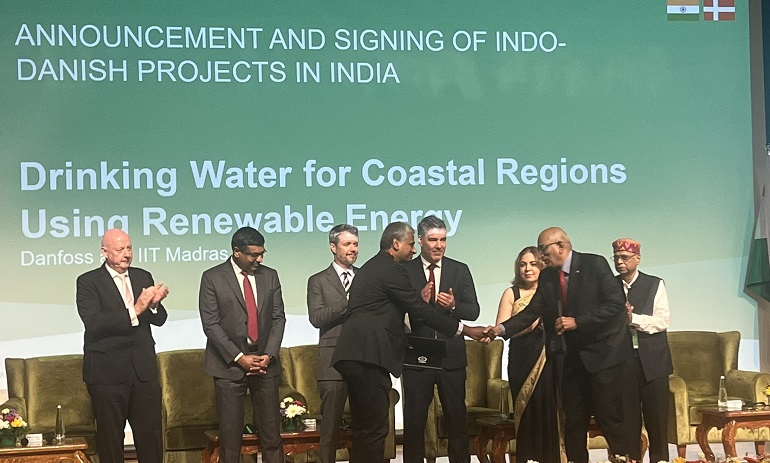Danfoss has reaffirmed its commitment towards “Decarbonization and Green Growth” in India by partnering with the Indian Institute of Technology-Madras. The partnership aims to promote research in the water and energy sectors, and two agreements were exchanged between Danfoss India’s President Ravichandran Purushothaman and Prof. Manu Santhanam, Dean (IC&SR), IIT Madras.
The exchange was attended by the crown prince of the Kingdom of Denmark Frederik André Henrik Christian, Freddy Svane, Ambassador of Denmark, Danish and Indian Ministers, and other dignitaries.
Denmark is the only country with whom India has a Green Strategic Partnership, as envisioned in the Joint Statement of September 2020 between Mette Frederiksen, Prime Minister of the Kingdom of Denmark and Narendra Modi, Prime Minister of India.
The partnership involves collaboration in the fields of circular economy, smart cities, sustainable urban development, and environment/water.
Danfoss & IIT-M exchanged two agreements for cooperation to promote research in the areas of securing drinking water for coastal regions using renewable energy and green fuels, including ‘Green Hydrogen,’ in line with the Green Strategic Partnership between India and Denmark.
Speaking on this occasion, Ravichandran Purushothaman, President- Danfoss India said, “As a global leader in making businesses more sustainable around the world, we at Danfoss are excited to help India take the next step towards a green transformation. The industry-academia partnership between Danfoss & IIT-M is a true embodiment of what the Green Strategic partnership aims to achieve. Through our association with IIT-M, we aim to prioritize the research and appropriate technology interventions with special focus on water and energy sectors. It is paramount for us to establish strong partnerships with world class universities such as IIT-M to meet future expectations.”
In accordance with the agreement, Danfoss and IIT-M are collaborating to convert seawater into freshwater through a Seawater Reverse Osmosis (SWRO) process leveraging ocean waves as an energy source with Danfoss High-Pressure (HP) Pumps. The compact Danfoss HP pumps with energy converting equipment can be installed on shore or on the buoys. A pilot desalination plant will be run for the purpose of supplying water to remote islands and costal hamlets.
Speaking about this collaboration, Prof. Manu Santhanam, Dean (IC&SR), IIT Madras, said, “Using a holistic and sustainable approach, the proposed cooperation is an effort to ensure safe and secure water to meet the current and future demands of coastal islands and small hamlets. Through our partnership with Danfoss India, we will have access to cutting-edge technologies for water applications like energy efficient and low CO2 emissions Danfoss HP pumps. It is Danfoss’ extensive experience and domain knowledge that makes them an ideal industry partner for IIT-M in this field.”
Over 15 patents have been awarded to Danfoss HP Pumps axial piston pump (APP) technology. By combining precision engineering and world-class production expertise, Danfoss designs and manufactures the latest reverse osmosis pumps. In RO systems, APP pumps use only water for lubrication, eliminating the need for oil. With efficiency rates up to 92%, the APP pump technology offers the highest efficiency in the industry.
Through another agreement as a part of Indo-Danish Research and Innovation Cooperation, IIT- M, Danfoss along with its subsidiary Danfoss Power electronics, Universities of Southern Denmark and Aalborg will develop ‘EcoGrif, – Efficient Power Electronic Grid-friendly Converter for increased Electrolysis Efficiency on a commercial electrolyzer stack suitable for Indian as well as the global markets.
In an era when climate change is a major concern, and a universal drive is being made toward integrating sustainability into all areas of development, MoUs between Danfoss and IIT-M represent a significant step in mitigating climate change and limit carbon emissions and help India attain its objectives outlined in the sustainable development goals.

